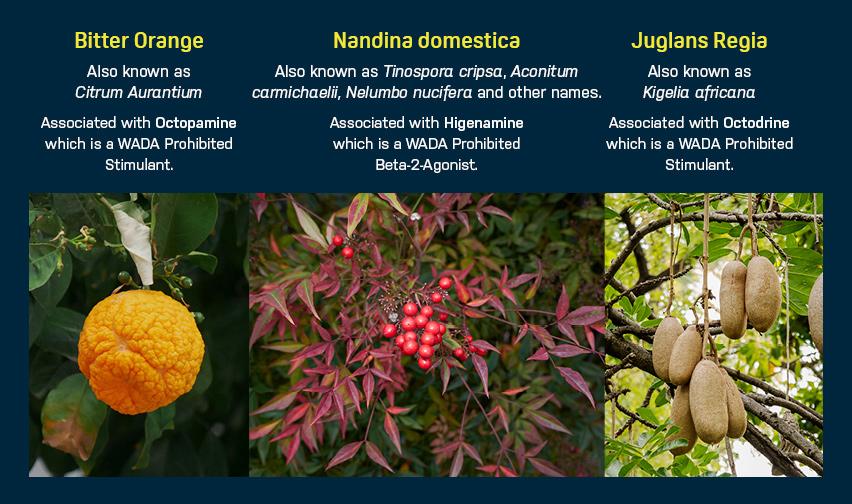Natural doesn’t equal safe
The dangers of botanicals
‘Natural’ and ‘plant-based’ is often listed as a positive claim on supplements and complementary medications. The reality is that ingredients listed with a natural, botanical (plant-based) source still present a notable risk to health and anti-doping for athletes.
Botanical ingredients are different to many other ingredients that are used in medicines. Botanical ingredients are complex and can contain many unique substances within them. The exact composition of a botanical ingredient may vary over time or between products. Differences in the breeding of a plant can lead to changes in the chemical composition of the botanical ingredients.
In addition to this variation, botanical ingredients listed on supplements and complementary medicines may be highly concentrated and processed. This change means that composition of the ingredient may differ from the original plant. While it may be safe to consume a plant as part of a normal diet, that doesn’t mean that the concentrated version is safe. An increased concentration of certain substances can result in health and anti-doping risks.
Botanical names may also be used in a misleading way to mask the presence of prohibited substances. Some products with botanical ingredients listed contain prohibited substances. This may be because a prohibited substance is present in the plant or a prohibited substance has been added under the name of a plant. For example, supplements with “geranium oil” listed in the ingredients have contained methylhexanamine, a synthetically produced stimulant that is WADA (World Anti-Doping Agency) prohibited.
''One of the issues we often see here at SIA is athletes who assume that because something is promoted as being 'natural', it’s good for them, and more is even better,” said Sport Integrity Australia Chief Science Officer, Vanessa Caig.
''This is misleading as there are plenty of 'natural’ products that have either anti-doping implications or health risks, and at worst, both. Athletes should always take the necessary steps to check anything that they consume is actually safe to consume, particularly in terms of the WADA Prohibited List.''
Specific botanical ingredients or names that have been associated with prohibited substances include:
- Bitter Orange
- also known as Citrum Aurantium
- associated with Octopamine which is a WADA Prohibited Stimulant.
- Nandina domestica
- Also known as Tinospora cripsa, Aconitum carmichaelii, Nelumbo nucifera and other names.
- Associated with Higenamine which is a WADA Prohibited Beta-2-Agonist.
- Juglans Regia
- Also known as Kigelia africiana
- Associated with Octodrine which is a WADA Prohibited Stimulant.
The presence of a prohibited substance under a biological name may result in an anti-doping rule violation. Under the World Anti-Doping Code’s strict liability principle, athletes are ultimately responsible for any substance found in their body, regardless of how it got there. That means, even if the prohibited substance is listed under a botanical name, if you consume it, you are still responsible.
Botanical ingredients can also present significant health risks. In 2024, the Therapeutic Goods Administration (TGA) issued multiple safety warnings about botanical ingredients and herbal products.
The warnings about herbal products were due to the presence of undeclared high-risk ingredients such as Garcinia cambogia, Camellia sinensis (green tea) and Withania somnifera (also known as Ashwanganda) with negative health impacts. These included yellowing of the skin and eyes (jaundice), weakness and unusual tiredness, sudden and potentially severe gastrointestinal symptoms, and severe allergic reactions. Severe instances of liver injury have been reported leading to the need for liver transplant.
Geraldton man Matthew Whitby knows the risks better than anyone.
In 2016, Matthew purchased protein shake with green tea extract in an effort to lose some weight and get fit. He thought he’d found the right product – one with good reviews and Australian made.
After only four or five shakes Matthew started displaying side effects that he hadn’t read online. Fatigue, and yellow skin, eyes and nails. Less than two weeks later he was admitted to hospital and was diagnosed with liver failure.
He did some research and found other people were experiencing similar symptoms after taking protein shakes with green tea extract.
He raised the matter with doctors and after he continued to deteriorate a liver biopsy was completed which showed there was still green tea extract in his liver, which should have been processed within days of consumption. Due to this it was determined that the green tea extract in the protein shake was why Matthew’s liver failed so quickly.
Matthew required a liver transplant and now, for as long as the liver lasts, he requires regular GP visits, blood tests and daily medication.
“I cringe now when I see people buying it or when I see it on the shelves because it brings back memories.
“I had two young kids at the time that were 3-weeks-old and 3-years-old, and they could have been without a dad.
“What I was hoping, was to get some sort of warning label on the product. It doesn't say it could cause liver or kidney failure or anything like that.
“I just want to help people by spreading the message and hope to help someone else make a better choice instead of just taking it straight off the shelf or online.”
Athletes and support personnel need to be aware of the health and anti-doping risks associated with herbal ingredients and be wary of products containing them. Natural or plant-based does not mean safe. If athletes still choose to use a product with botanical ingredients, they should use the SIA app which helps athletes find products with a lower risk of testing positive.


